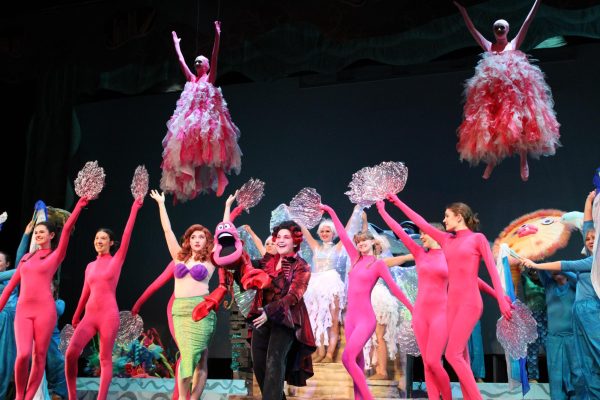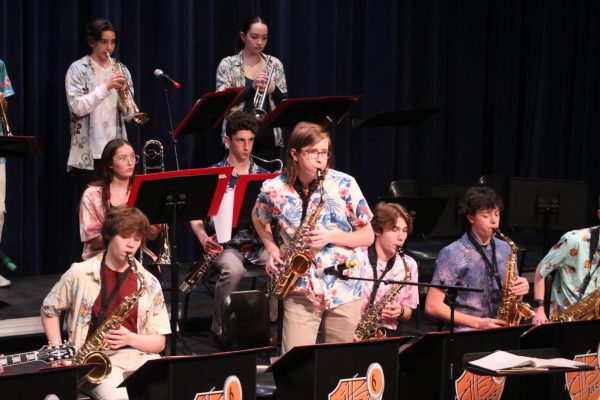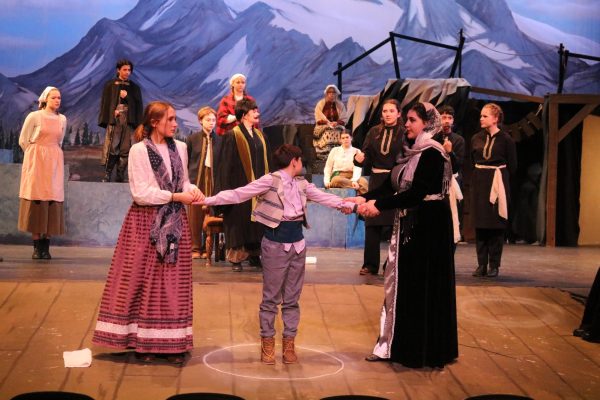With over 50 different course offerings, Libertyville High School provides its students with a unique opportunity to explore every aspect of Fine Arts. From visual to performing arts, each program is designed to provide students with experience in several fields.

Problem
At Libertyville High School, students are required to take one year of either world language or fine arts; however, in the coming years, the state government will require each student to earn two years of world language to graduate. This law leads many to question how it will impact fine arts education and involvement at this school.
At other schools, such as Lake Forest High School and Warren Township High School, students must enroll in fine arts for at least a year. Mr. Christopher Thomas, the director of Theater, sees the difference this involvement makes.
“It cultivates creativity among many other skills [in students]” Mr. Thomas said. “I’ve seen [students] improve in the things all of us value, whether they’re an aspiring actor or just someone who’s taking the class because they enjoy it.”
Benefits of Fine Arts
Whether it’s playing an instrument in Band or developing photos in Dark Room, Fine Arts have a positive impact on students’ academics, mental health and overall well-being.
According to an article in Natural Endowment of the Arts, high school students who complete fine arts credits tend to earn higher cumulative GPAs in subjects across English, Math, Science and Social Studies. This suggests a positive correlation between arts and overall academic success.
After teaching for 13 years, Mr. Matthew Karnstedt, a D128 music teacher, has seen the numerous benefits of arts education in students.
“I’m a firm believer that no matter what type of student you are, you can benefit from experience in the arts,” Mr. Karnstedt said. “I think it is important for students to have time in their day where they can just enjoy.”
Even further, both Mr. Karnstedt and Mr. Thomas believe involvement in Fine Arts is essential to the school’s “DARING” mission, creating well-rounded students and giving them multiple pathways.
“A career field in music production might not be as obvious as a career field as an engineer, for example,” Mr. Karnstedt said. “There are avenues, and you don’t really know about that unless you do it.”
Without taking a class and gaining this experience in high school, students miss out on a truly enriched education, not being able to cultivate a lifelong passion for the arts.

Student Experience
Each class and extracurricular develops students’ creativity and skills across the fine arts. While advanced ensembles and AP classes require experience, electives offer access to the arts for all skill levels.
Many students have found their place in the school’s fine arts programs. Senior Wren Frey, who has been involved in theatre, choir and band programs for the last year, found that these spaces give all members a strong sense of community and belonging.
In my experience, [these programs] are incredible and amazing,” Frey said. “It’s just such a good community because we’re very inclusive.”
Mr. Thomas has seen a similar effect on members of the theatre community. As students have to work together – in a way that’s different from sports or other activities – to create one large product, Mr. Thomas believes that a connection made in the arts is unique to any other.
“Students, who have been part of multiple extracurriculars and or other [sports] teams here at LHS, when they’re part of the theater family, they often say this is the one that feels the most true to that word family,” Mr. Thomas said.
The music department offers a trip every year; this year, the choir program traveled to Sicily and the orchestra program visited Germany and Prague. In 2025-26, the Marching Wildcats will perform at Disneyland, as their trip of the year.
Furthermore, in the 2025-26 school year, AP Music Theory, an introductory college class that teaches the basics of music theory, will not be available for students, as only eight students had requested for this course.
Tyler Houglum, who will be a senior for the 2025-26 school year had requested to take this class for his final year. Due to several reasons, Houglum will be missing out on a career-building experience.
“I was looking forward to [the class] because I want to go into sound engineering and music production,” Houglum said. So, taking that class would have helped in the future.”

Solution
With this new law being passed in Illinois, teachers, students and even parents who are involved with the fine arts are worried about the continuation of all the LHS fine arts programs.
Many wish that the district would implement a policy which requires students to take some art classes at this school. By incentivizing this important element of self-growth, students may find a healthy creative outlet or unexpected passion, which would not be possible without a policy.
As seen in other schools in our area, this policy or a similar one would not only benefit the student experience, but it would also help the school grow its already captivating fine arts program.
“While we have robust programs and robust support for our programs here, there is an assumption that the support for these programs goes unquestioned,” Mr. Thomas said. “A fine arts requirement would be an action that our community, school board and school community can take to stand behind their support, rather than assume these robust programs will continue.”
By instilling a requirement, the fine arts community would grow in unexpected ways. According to Mr. Karnstedt, this growth will most likely be seen in the semester electives, rather than the other extensive options.
“I think our band, choir and orchestra numbers might see a bump,” Mr. Karnstedt said. “But, I think our single semester electives like a photography class, theatre workshop and guitar would see the largest impact.”
While many students take seven to eight classes daily, others choose early release or late start, limiting their schedule to six classes including lunch.
Unlike at Vernon Hills High School, LHS offers early release and late start, which many students enjoy. However, this option can limit access to electives—especially in the arts—reducing students’ opportunities to experience their full benefits.
Conclusion
As new graduation requirements emphasize world language, Libertyville High School’s strong Fine Arts programs may be at risk. While language instruction has value, it could limit students’ access to the well-known academic, emotional, and community benefits of arts education.



![The Concert Choir sings their last song of the night, “Wide Open Spaces” by Sarah Quartel. Senior Ella Globerger said, “These concerts in general, [I] like promoting people to come see them, because what we do here is really special, and it's really amazing to be able to share art with the world.”](https://www.lhsdoi.com/wp-content/uploads/2025/10/IMG_1099-1200x800.jpg)
![Senior River Thompson joins the Jazz Ensemble by singing “That Old Black Magic” by Mercer and Arlen Arr. Mark Taylor, along with senior Annie Brody on guitar and junior Thomas Teixeira on bass, earning big applause. “[The concert had] great energy because it's the last [jazz concert] of the year,” Brody said.](https://www.lhsdoi.com/wp-content/uploads/2025/04/Eight-That-Old-Black-Magic-1200x800.jpg)

Sue Heinen • Jul 19, 2025 at 8:25 pm
I graduated from LHS in 1984. I took 2 years of Spanish, with another 2 years in college. We must recognize, while I know that this thought may meet resistance, that Spanish is Our Country’s second language. Many, many careers in the FBI, CIA, DEA and many others require a fluency in Spanish. This language will help you with a career, right here in the USA. Many of my friends took French, German, etc., and they never used it again. The other languages are creative, while not as practical, in a career here! If we have to focus on a language, let’s require one, that will assist with many places of travel and careers. This allows for riffing in the other languages, yet giving students the many varieties in the wonderful Arts. If this is a requirement, many will find it rewarding and interesting, especially in Our Global Economy. The other Countries emphasize the English Language, to do business, with us in the USA! Let’s finally require something that may even help those get a job, right out of high school, for those that have no desire to go on to a college career. I have been and remain a large tax payer here and in the past into the Barrington District. Sincerely, Sue Heinen
PS: I thank Ms. Mary Price and Donna Harvey for the empowered woman that I am today! Bow!!